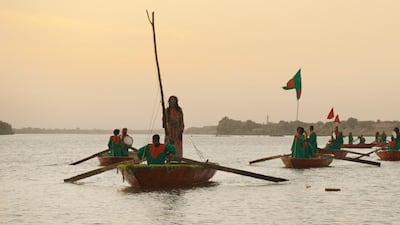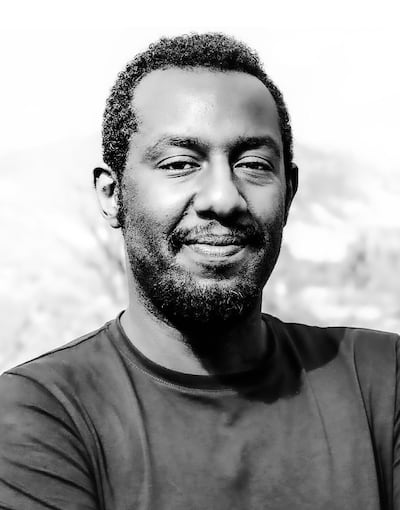When Omar Al Bashir came to power in Sudan through a coup in 1989, cinema was one of the first things to fall under his axe. Theatres across the country closed and any semblance of a film industry all but died with them.
Art, however, is a hard thing to contain. For 30 years, Sudanese filmmakers such as Amjad Abu Alala, Suhaib Gasmelbari, Marwa Zein and Hajooj Kuka operated primarily outside the country, telling the country's stories, hoping that one day cinema would return to Sudan.
Abu Alala's first feature, You Will Die at 20, is a metaphor for the country under the rule of Al Bashir. Based on a short story by Sudanese writer and activist Hammour Ziada, the film tells the story of a boy, 19, called Muzamil (Mustafa Shehata) who, as an infant, was told he would die on the day he turns 20. Muzamil lives his life passively in a small village in central Sudan, following the orders of the authority figures in his life about how he should live. He slowly learns to think for himself, breaking free from the shackles of expectation and, ultimately, setting his own destiny – much like the Sudanese people did when the regime of Al Bashir was overthrown on April 11 last year.
You Will Die at 20, which won the Lion of the Future Award when the film was screened at last year's Venice Film Festival, has been embraced by Sudanese people across the world. "They travelled from across Canada and the US to come to the Toronto premiere," Abu Alala tells The National. The festival had to put on an extra screening to accommodate everyone. Then the same thing happened in Germany.
"Every Sudanese person inside or outside Sudan was so disappointed by life itself. The government was ruling everything. They didn't believe that anything good would come from us. The film launched after the revolution and I think now Sudanese people are looking to it as a sign of the new Sudan, a new Sudan that supports art.
Something in the Sudanese mind believes that, because they want to trust the Sudanese government and this new liberal system. I like that because I want to believe this, too."
Born in Al Ain, Abu Alala started making short films in the early 2000s as a student at the United Arab Emirates University. There, he formed a cinema and theatre group with which he travelled across the Arab world shooting films, screening them and doing theatre. All in all, he spent 15 years working on short films and programming for film festivals across the region, before he found the story he knew would become his first feature.
Abu Alala found it easy to connect with Ziada's short story. He left the UAE to live in Sudan during his formative years and struggled with the limitations of Sudanese society in the 1990s. While adapting Ziada's story for film, he decided to connect it even more closely with his own experiences, moving the setting to his own home in Central Sudan, three hours south of Khartoum, and filming in the village where his father was raised.
"Cinema should always be about the fire inside of us," Abu Alala says. "If we didn't try to find that fire, it would just be a cold piece of work. I wanted to get my fire outside. I think the fire here is in many things. I hate how the society puts people in a corner, not because of religion, but because they're so focused on heritage – this is how they used to do it, so you need to do it like them. We need to walk in the same footsteps as our grandmothers and grandfathers.
"I think I wanted to tell Muzamil, the character, that you belong to yourself, not to your society, not your mother, not to your sheikh. Not to anyone. Maybe the revolution that happened at the end of the film looks like the revolution that happened in Sudan also. All the fire inside these people gets out in 2019, just like Muzamil. When I got my fire out, the Sudanese people did it, too – we did it together."
The film has begun to earn him global success, collecting awards at international festivals – it most recently won the Feature Narrative Competition at El Gouna Film Festival in Egypt – and it is being screened at Cinema Akil in Dubai until Friday.
Abu Alala says he can't help but think about what such recognition could mean for the future of Sudanese cinema. "I feel that people want me to top it," he says. "With all the success, all that's written in the media has been saying that finally Sudanese cinema is back. This makes me feel afraid because I don't have a guarantee for that. This was 100 per cent a personal effort."
He is, however, supporting other Sudanese directors to help them get their projects off the ground. As for his own career, Abu Alala says he wants to make films across the world. "All my life I've never been related to one nationality," he says. "Sudan is my country and my family, but my mother is Egyptian. I've loved Egyptian cinema since I was a kid. I want to do an Egyptian film. I was born and raised in the UAE, so I want to produce Emirati filmmakers because I relate to stories here just as much as I do in Sudan or Egypt.
"I see myself as a global citizen, so if there are stories to be made in Africa or Latin America, I want to go do it. I love [writers] Gabriel Garcia Marquez and Isabel Allende. Why can't I go down to Mexico and adapt one of his books with Salma Hayek? I can see myself doing things in different places, which is why I signed with the Creative Artists Agency and we're talking about the next steps. They're bringing me projects for Netflix and HBO."
Abu Alala reveals HBO Europe has bought the rights to You Will Die at 20, securing it a large audience across the continent. For now, Abu Alala is focused on another milestone – You Will Die at 20 will be screened at recently reopened Sudanese cinemas on Monday, January 27, giving the people of Sudan their first chance to celebrate the filmmaker as his star begins to ascend.
You Will Die at 20 is at Cinema Akil in Dubai until Friday



